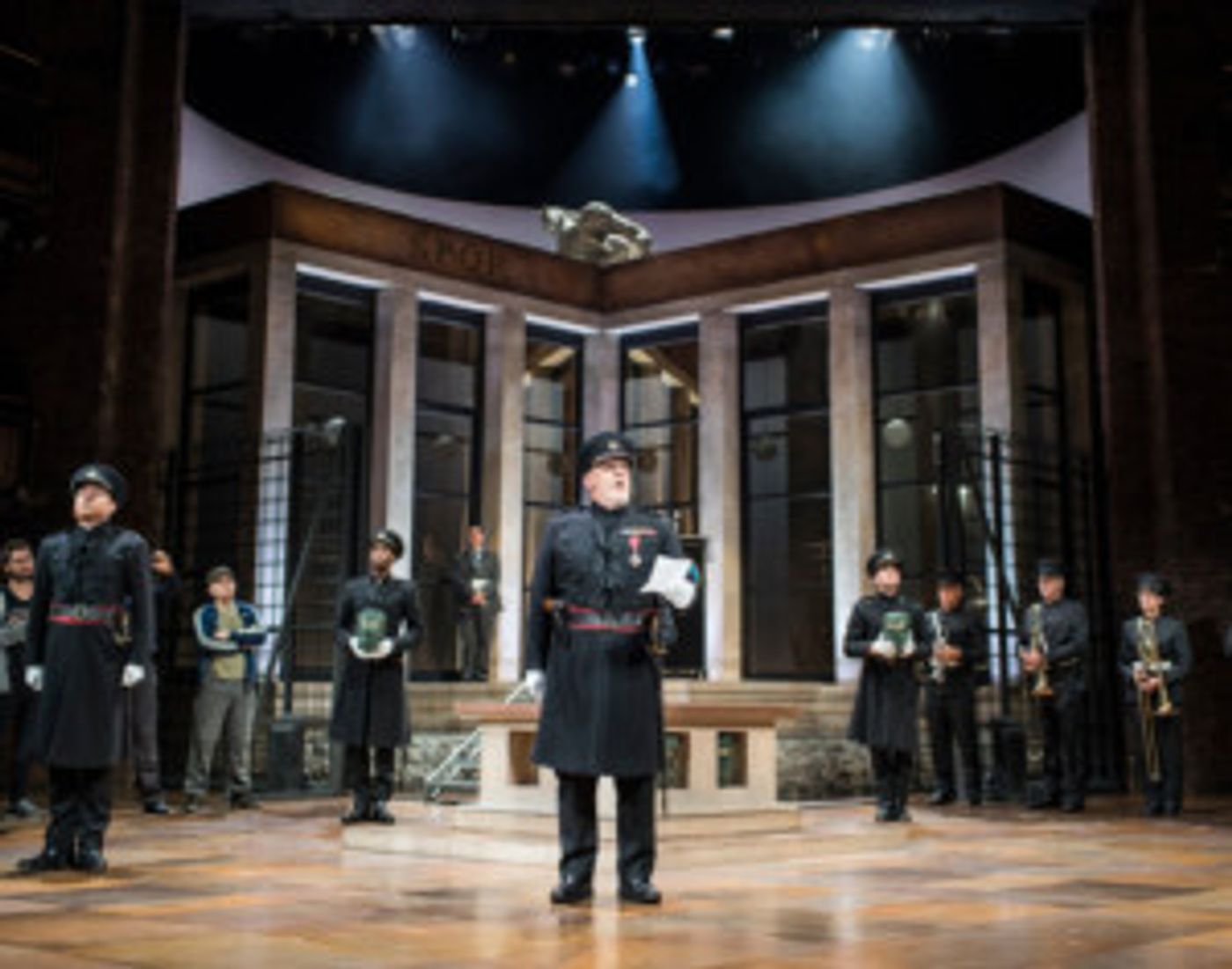Review: TITUS ANDRONICUS, Barbican Theatre

Please note: this article contains references to rape and sexual assault![]()
It was September of this year that I first saw this particular Titus Andronicus, at the Royal Shakespeare Theatre. Back then, I was struck by how timely a production this seemed: corruption of power, toxic masculinity and the silencing of women all at the forefront under Blanche McIntyre's direction.
A month later, the Harvey Weinstein scandal broke. Two months after that, the production transferred to the Barbican Theatre. Today, it proves an even more powerful and potent production, on both the Barbican and global stage.
Following the fallout of the election of emperor, the city is restless. People run across the stage and even through the audience itself. Set in the modern day, some run towards the mayhem to film it on their phones, others away from it. Fights soon break out between factions, in stylised choreography. No-one ever makes contact, quite literally dancing round each other and the issue at hand.
Saturninus is soon crowned emperor, on the advocacy of returning war hero Titus Andronicus. Having lost sons to this war, Titus, his brother Marcus and children Lucius and Lavinia soon lose even more under this new sway. All this is overseen by Titus's once captive now empress Tamora, married to Saturninus but more than plotting with her lover Aaron.
The private and public take centre stage against the backdrop of Robert Innes Hopkins' Capitol, transformed for each production of the Rome MMXVII Season. Here, its white columns glisten, proud. But though they stand safe, they are not sure.
Metal gates surround the structure and surveillance is at every turn in this "palace full of tongues, eyes, and ears". As Saturninus and the nobles venture out of their gates for a hunting trip, this vast city becomes a small wood through Malcolm Rippeth's lighting design, "ruthless, dreadful, deaf, and dull". It is here that Lavinia is raped.
The rape of Lavinia is one of the hardest scenes to watch, let alone to imagine staging or acting in. So distressing a moment does it prove in this particular production, that audience members left during the Stratford Upon Avon run.
But that's the power of McIntyre's vision: realism. Brutal but bold, she does not shy away from the issues pertinent in the text and to today. As Lavinia's uncle discovers her after she has been raped, he pulls her close to him, dragging up her pants and trousers, then leading her by the arm off stage. A modern day audience (should) know this is wrong, and indeed I heard some "No"s.
"Shall I speak for thee?" Marcus asks Lavinia. "No," again I heard a few people whisper, myself restrainedly doing so too. This is the first production of Shakespeare I've ever wanted to shout back at. In the treatment of the mute and abused Lavinia, McIntyre speaks volumes and resounds the female voice.
Other moments produce less vocal reactions at the Barbican, if any. As Titus's griefs grow, he slips further and further into madness. A digging scene and box scene in particular seem to confuse the audience, more so than at the intimate RST.
Certain court scenes do naturally draw the audience in though, appropriately presentational in the proscenium arch. David Troughton, however, is able to create a personal and unique relationship with the audience in this space. Maddened by his losses, Titus seeks vengeance. "And if you love me, which I think you do," he says to his family. Except he doesn't. He actually turns to the audience, as if seeking their approval.
Later, with the rapists Demetrius and Chiron now at his mercy, he asks us another question: "What shall we do?" And again, we almost answer. Half the audiences nods, hoping for the brothers' punishment. The other half laughs, knowing that it will be a quite literal come-uppance.
This relationship with the audience is a testament to Troughton's skill. This is an aging Titus, indeed more needful of a "Staff of honour for [his] age", shaking and fretting. But in anger, Troughton is a force. His right hand man, Patrick Drury is always watching everyone and everything, as the considered but deeply calculating Marcus.
Not all brothers get on as well: Martin Hutson and Dharmesh Patel are well-matched as the supercilious Saturninus and brazen Bassianus, trading middle fingers across court. Appearing in their first RSC seasons, Hannah Morrish shines as Lavinia while Stefan Adegbola relishes every moment as the villainous Aaron.
Rounding off the Rome MMXVII Season, McIntyre's Titus Andronicus hits home to London 2017.
Titus Andronicus at Barbican Theatre until 19 January, 2018
Photo credit: Helen Maybanks
Reader Reviews
Powered by
|
Videos

